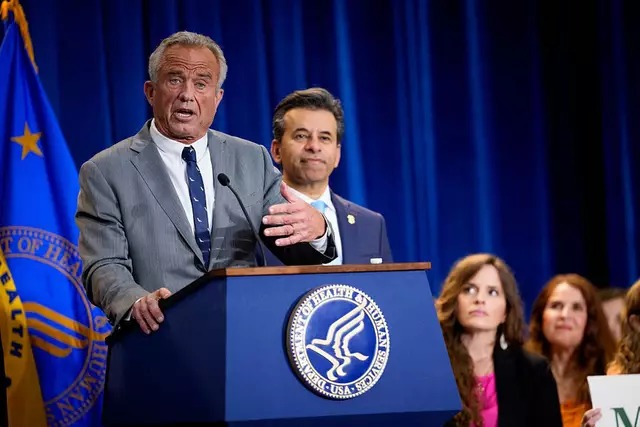RFK Jr. Faces Backlash Over Plan to Collect Private Medical Records for Autism Study
Robert F. Kennedy Jr., now serving as Secretary of Health and Human Services, is facing mounting criticism over a controversial plan to study autism by gathering Americans’ private medical records and launching a national autism registry.
Autism, described by the Mayo Clinic as a “condition related to brain development” with wide variations in how it presents, has long been misunderstood. Kennedy, however, has called autism “preventable” and warned of an “autism epidemic” he believes can be addressed.
Speaking at a Cabinet meeting at the White House on April 17, Kennedy announced:
“We’ve launched a massive testing and research effort that’s going to involve hundreds of scientists from around the world. In September, we will know what has caused the autism epidemic, and we’ll be able to eliminate those exposures.”
RFK Jr. said the study will involve ‘hundreds’ of scientists (Andrew Harnik/Getty Images)
Massive Data Collection Effort Underway
As part of the initiative, the National Institutes of Health (NIH) announced on Monday (April 21) that it has begun gathering private medical records from a range of federal and commercial databases. This effort will give researchers chosen for Kennedy’s project access to “comprehensive” patient information covering a broad swath of the U.S. population.
NIH Director Dr. Jay Bhattacharya explained the move:
“The idea of the platform is that existing data resources are often fragmented and difficult to obtain. Even data resources within the federal government are sometimes hard to access. This platform aims to fix that.”
The data being collected includes:
-
Prescription records from pharmacy chains
-
Lab tests and genetic information from the Department of Veterans Affairs and the Indian Health Service
-
Insurance claims from private providers
-
Information from smartwatches and fitness trackers
The NIH is also negotiating with the Centers for Medicare and Medicaid Services to further expand access to health records.
The study will involve 10 to 20 research groups, selected through the NIH’s standard vetting process. While researchers will have access to the data, Bhattacharya emphasized that they will not be allowed to download it and promised “state-of-the-art protections” to safeguard confidentiality.
Creation of a National Autism Registry
In addition to the data study, the NIH plans to establish a national disease registry focused on autism, allowing real-time tracking and analysis of Americans diagnosed with the condition.
Bhattacharya said the initiative would create “a robust and secure computational data platform for chronic disease and autism research.”

Kennedy is the secretary of the Department of Health and Human Services (Alex Wong/Getty Images)
Fierce Public Backlash
However, the announcement has sparked immediate backlash, especially among autism advocates and parents.
One Twitter user, who identified herself as the mother of a child with autism, voiced her anger:
“As a mother of a child with autism I don’t approve this. My son’s medical records should stay private. We need more funding for programs that benefit our children, not ‘studies’ that don’t help them.”
Another critic wrote bluntly:
“I do not consent to this. This is not okay.”
Privacy concerns are at the center of the outrage, with many arguing that individuals and families were not asked for consent before their data became part of the government’s new research plan.
Next Steps
Despite the controversy, Bhattacharya said the NIH is moving on a “rapid timeline” and plans to share study results later this year.
As the debate intensifies, the project’s future—and the public’s trust in it—could hinge on how the government addresses concerns around privacy, consent, and the intended use of this sensitive information.


